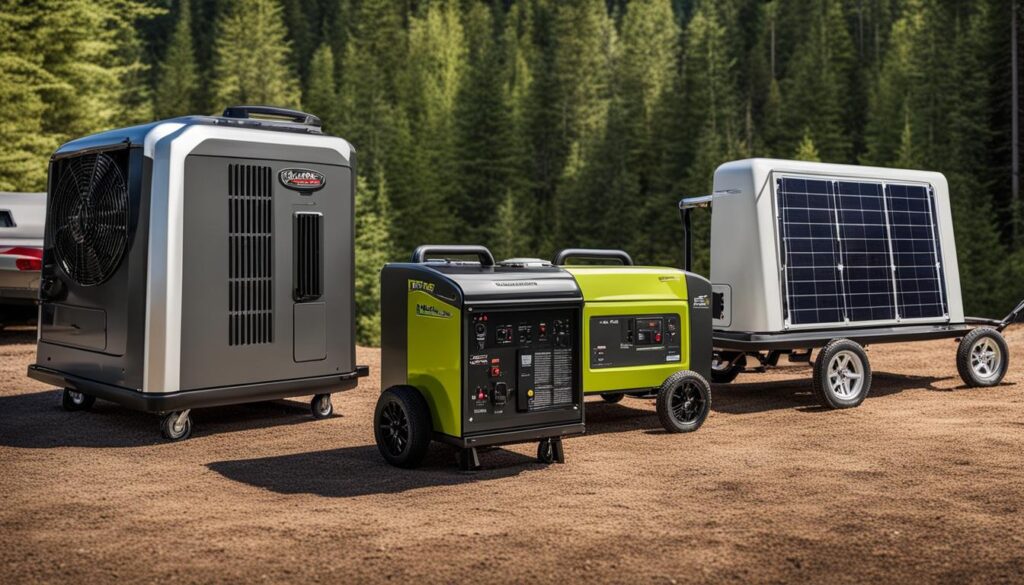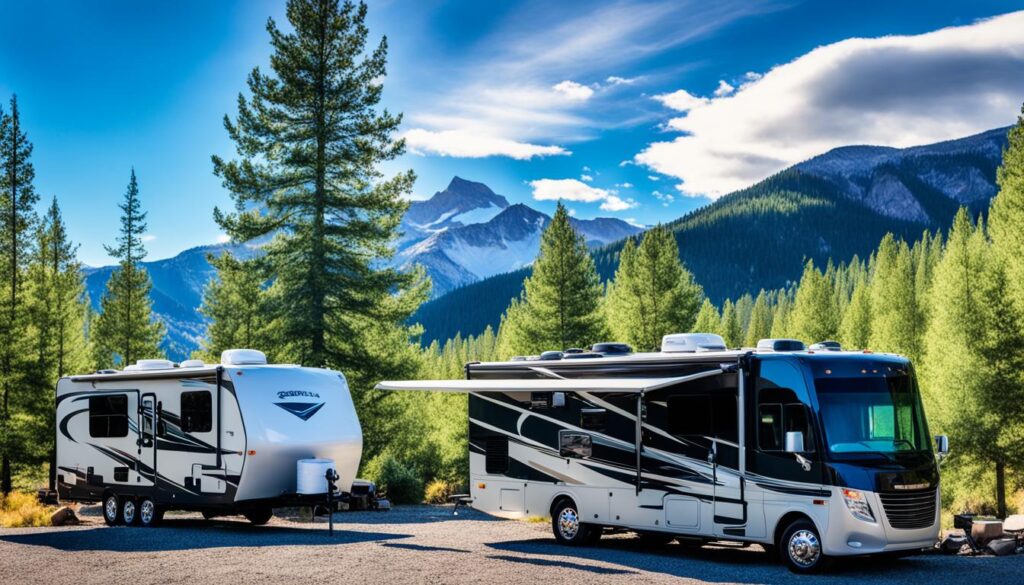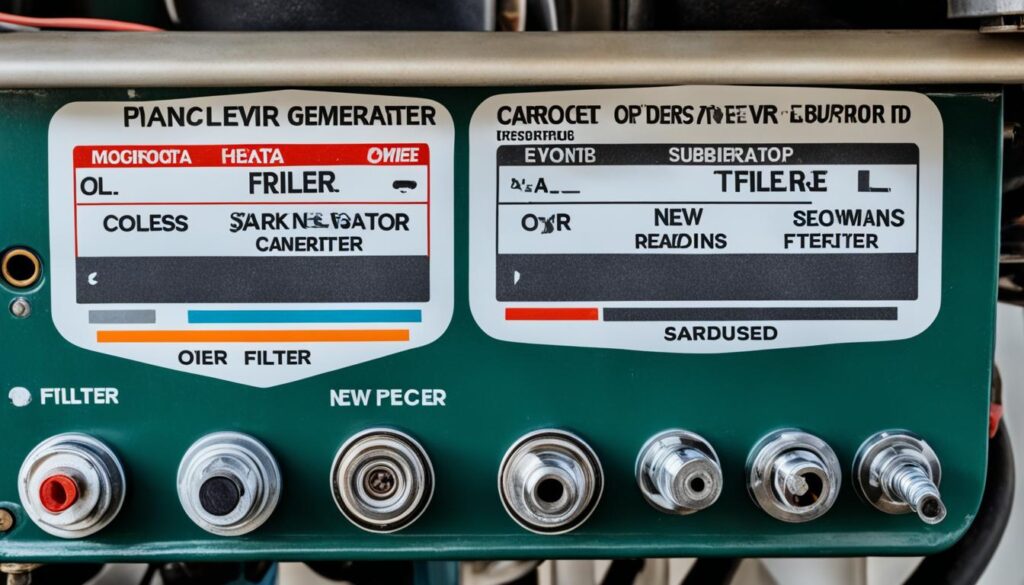When it comes to RV generators, one crucial question arises: how long do they actually last? Whether you’re a seasoned RV enthusiast or just starting your adventure on the open road, understanding the lifespan of an RV generator is essential.
Many factors can influence the longevity of an RV generator, including the type of fuel used, frequency of maintenance, and usage habits. But what is the average lifespan of an RV generator? And can it be prolonged with proper care?
Prepare to uncover the truth about the lifespan of RV generators and learn how to make your generator last as long as possible. From the types of generators and their run times to the safety considerations and pro tips for extending their lifespan, we’ll cover it all. Let’s dive in!
Key Takeaways:
- The lifespan of an RV generator varies based on factors such as fuel type, maintenance, and usage frequency.
- Portable generators typically run for 8-13 hours, while built-in generators can run continuously with proper maintenance.
- The type of fuel used and the frequency of maintenance significantly impact an RV generator’s lifespan.
- Running an RV generator all night can have effects on its lifespan and safety considerations to be aware of.
- By following pro tips for maintenance and care, you can extend the lifespan of your RV generator and ensure it powers your adventures for years to come.
Contents
Types Of Generators and Their Run Times
When it comes to RV generators, there are two main types to consider: built-in generators and portable generators. Each type offers distinct advantages and run times that can vary depending on several factors. Let’s take a closer look at the characteristics of these generators and their run times.
Built-In Generators
Built-in generators are integrated into the RV’s electrical system, providing a seamless power source. They can be started using the vehicle’s battery and run on gasoline, diesel, or propane. These generators draw fuel directly from the RV’s fuel tank, ensuring convenience and eliminating the need for additional fuel storage.
One significant advantage of built-in generators is their impressive run times. With proper maintenance, these generators can operate continuously for days, providing a reliable and uninterrupted power supply during your RV adventures.
Portable Generators
On the other hand, portable generators are designed to be situated outside of the RV and have their own fuel source. They are typically powered by gasoline or propane and offer greater flexibility in terms of location and transportation.
Portable generators come in various sizes and capacities, allowing you to choose the one best suited to your power needs. The run time of a portable generator depends on factors such as its wattage, the total wattage of the appliances being powered, the size of its fuel tank, and the type of fuel being used. A portable generator can hold anywhere from 1 to 10 gallons of fuel and provide approximately 8-13 hours of continuous power.
It’s important to note that the run times mentioned above are approximate and can vary based on usage patterns and load management. It’s always recommended to refer to the manufacturer’s specifications for precise details regarding the run time of a specific generator.

As you can see, both built-in and portable generators offer their own unique advantages in terms of convenience and run times. Whether you prioritize continuous power for an extended period or require portability and flexibility, there’s a generator type to suit your specific needs.
How Long Is It Safe To Run An RV Generator?
When it comes to running an RV generator, safety should always be a top priority. Understanding the safe run time of an RV generator and following the necessary safety tips can help ensure a smooth and worry-free experience. So, let’s dive into the essential information you need to know.
Safe Run Time of RV Generator
Both built-in and portable RV generators can typically be safely run for a recommended duration of 8-24 hours. However, several factors need to be considered to ensure safe operation and avoid any potential risks.
- Ventilation: Proper ventilation is crucial when running an RV generator. This helps prevent the buildup of harmful exhaust fumes inside the RV. Ensure that your generator is placed in a well-ventilated area and never operate it in enclosed spaces.
- Fuel Supply: To run the generator safely, make sure it has an adequate fuel supply. Running a generator with insufficient fuel can damage the generator and its appliances. Regularly check the fuel level and refill as needed.
- Extreme Weather Conditions: It’s important to avoid running the RV generator in extreme weather conditions, such as during heavy rain, snowstorms, or high temperatures. Extreme weather can affect the generator’s performance and pose safety hazards. If necessary, consider alternative power sources during such conditions.
By adhering to these safety tips, you can ensure the continued safe and efficient operation of your RV generator.
Safety Tips for Running an RV Generator
To further enhance the safety of running your RV generator, consider the following tips:
- Regular Maintenance: Properly maintain your RV generator by following the manufacturer’s recommended maintenance schedule. This may include tasks like oil changes, filter replacements, and spark plug checks. Routine maintenance helps prevent breakdowns and ensures reliable operation.
- Adhere to Quiet Hours: When camping in designated areas or campgrounds, be mindful of quiet hours. Running the generator overnight can disturb other campers and cause safety hazards. Respect the rules and regulations in place to maintain a pleasant camping experience for everyone.
To summarize, running an RV generator for the recommended safe run time of 8-24 hours is generally safe as long as proper precautions are followed. Ensure proper ventilation, maintain an adequate fuel supply, and avoid extreme weather conditions. By implementing these safety tips, you can enjoy the convenience and reliability of your RV generator while prioritizing the well-being of yourself and others.

Factors Affecting RV Generator Lifespan
Several factors can influence the lifespan of an RV generator. The type of fuel used and the frequency of maintenance are significant factors. Diesel generators are often more durable and have longer lifespans compared to gasoline or propane generators. Regular maintenance, including oil changes, filter replacements, and fuel line checks, can extend the life expectancy of an RV generator.
Environmental factors, such as extreme temperatures and humidity, can also affect the generator’s performance and longevity. Extreme heat or cold can put additional stress on the generator’s components, while high humidity can cause corrosion. It’s important to protect the generator from these conditions, either by storing it in a temperature-controlled environment or using protective covers when not in use.
Load management is another crucial factor in prolonging the lifespan of an RV generator. Running the generator at its maximum load for extended periods can increase wear and tear on the engine and other components. Load shedding, where power usage is balanced across appliances and systems, can help minimize strain on the generator.
The use of fuel stabilizers is also recommended to extend the generator’s lifespan. These additives prevent fuel degradation, especially for generators that are not used frequently. Stabilizing the fuel helps maintain its quality, preventing clogs in fuel lines and other fuel-related issues.
Overall, paying attention to these factors and implementing proper maintenance and storage practices can significantly extend the lifespan of an RV generator, ensuring reliable power for your adventures for years to come.
Pro Tips for Extending RV Generator Lifespan
- Perform regular maintenance, including oil changes, filter replacements, and fuel line checks.
- Protect the generator from extreme temperatures and humidity by storing it in a temperature-controlled environment or using protective covers.
- Practice load management by balancing power usage across appliances and systems.
- Use fuel stabilizers to prevent fuel degradation, especially for infrequently used generators.
| Factors | Effect on RV Generator Lifespan |
|---|---|
| Type of fuel used | Diesel generators tend to have longer lifespans compared to gasoline or propane generators due to their durability. |
| Frequency of maintenance | Regular maintenance, including oil changes, filter replacements, and fuel line checks, can extend the life expectancy of an RV generator. |
| Environmental factors | Extreme temperatures and humidity can affect the generator’s performance and longevity, necessitating proper storage and protection. |
| Load management | Practicing load shedding and avoiding continuous operation at maximum load can reduce wear and tear on the generator. |
| Use of fuel stabilizers | Fuel stabilizers prevent fuel degradation and maintain the quality of fuel, minimizing fuel-related issues. |
Running Your RV Generator All Night: Effects and Safety Considerations
Running an RV generator all night can have several effects on both its lifespan and safety aspects. While modern generators are designed for extended use, it is important to consider the potential risks and take necessary precautions.
Continuous operation throughout the night can increase the wear and tear on the generator, resulting in faster degradation of internal components. This can lead to reduced efficiency, increased maintenance needs, and potential breakdowns in the long run.
One significant concern when running the generator continuously is overheating. Extended periods of operation can generate excessive heat, potentially causing damage to the generator and its surrounding environment. Overheating can accelerate the aging process and compromise the performance and lifespan of the generator.
It is crucial to be aware of the safety hazards associated with running an RV generator all night. Carbon monoxide buildup poses a serious risk as it is colorless and odorless, making it difficult to detect. This can lead to carbon monoxide poisoning, a potentially life-threatening condition. Additionally, continuous generator operation can increase the risk of fire hazards, especially if the generator is not properly maintained or positioned. Noise pollution is another consideration, as generators can create loud and disruptive sounds throughout the night, impacting both yourself and neighboring campers.
When considering running your RV generator all night, it is essential to carefully monitor its performance, including temperature levels and any signs of malfunction or overheating. Adhering to safety guidelines, such as ensuring proper ventilation, placing the generator a safe distance from combustible materials, and using carbon monoxide detectors, can help mitigate potential risks. Additionally, being mindful of noise restrictions and respecting quiet hours in campgrounds is essential for maintaining a peaceful and safe environment for everyone.
Overall, while running an RV generator all night may be tempting for continuous power supply, it is important to carefully weigh the effects on the generator’s lifespan and consider the safety factors involved. Extended operation requires proper monitoring, adherence to safety guidelines, and a thorough understanding of the potential risks and precautions to ensure a reliable and safe RV camping experience.
Pro Tips for Extending RV Generator Lifespan
To maximize the lifespan of your RV generator, proper maintenance is crucial. Regular check-ups are essential to catch any minor issues before they escalate. This includes routine oil changes, filter replacements, and spark plug checks. By staying on top of these tasks, you can ensure the smooth operation of your generator for years to come.
Another vital aspect of maintaining your RV generator is proper storage. Keep it in a dry and clean environment, and make sure to drain the fuel tank before long periods of inactivity. Utilizing protective covers will shield your generator from the elements, preventing potential damage and degradation.
When using your RV generator, practice load management. Be aware of the power requirements of your appliances and run the generator at 50-80% of its maximum load capacity. This will reduce wear and tear, and ultimately extend the lifespan of your generator.
Add fuel stabilizers to your routine maintenance. These additives help prevent fuel degradation, particularly for generators that are not used frequently. By keeping the fuel in optimal condition, you can prolong the life of your generator and ensure it is always ready to power your adventures.
In addition to regular maintenance, it is recommended to schedule professional servicing for your RV generator. Professionals can catch any overlooked issues and perform complex maintenance tasks that may be beyond your expertise. Their expertise will help keep your generator in top shape and maximize its lifespan.
By following these pro tips and implementing a comprehensive maintenance routine, you can extend the lifespan of your RV generator and enjoy reliable power during all your travels.
FAQ
How long does an RV generator last?
The lifespan of an RV generator can vary depending on factors such as fuel type, maintenance, and usage frequency. On average, a well-maintained generator can last for many years.
What is the average lifespan of RV generators?
The average lifespan of RV generators can range from 1,000 to 5,000 hours of usage, depending on various factors. With proper care and maintenance, some generators can even exceed this range.
How can I increase the lifespan of my RV generator?
To extend the life of your RV generator, regular maintenance is crucial. This includes routine oil changes, filter replacements, and regular usage to prevent engine components from deteriorating. Running the generator with at least a 50 percent load for a minimum of two hours every month is also recommended.
What factors can affect the lifespan of an RV generator?
Several factors can influence the lifespan of an RV generator. These factors include the type of fuel used, frequency of maintenance, environmental conditions, and proper storage. Diesel generators tend to have longer lifespans compared to gasoline or propane generators.
Can I run my RV generator all night?
While it is generally safe to run an RV generator for its expected run time, running it all night can have potential effects on its lifespan and safety considerations. Continuous operation can increase wear and tear on the generator and pose safety hazards such as carbon monoxide buildup and fire risks.
What are some pro tips for extending the lifespan of an RV generator?
To maximize the lifespan of an RV generator, regular preventive maintenance is key. This includes oil changes, filter replacements, and spark plug checks. Proper storage, load management, the use of fuel stabilizers, and professional servicing can also contribute to extending the generator’s lifespan.






